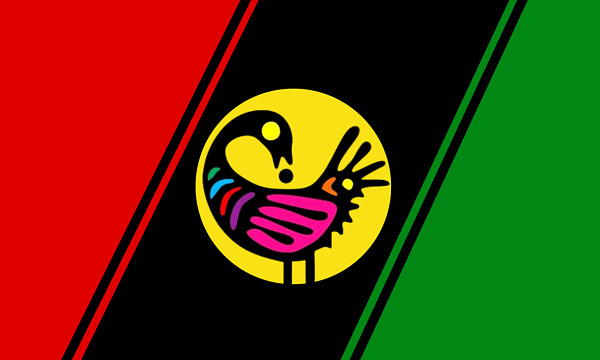Essay by Devi Alleyne-Omkaro, published here courtesy of the Halton Black History Awareness Society
This week, Local-news.ca presents the first winning essay from the Halton Black History Awareness Society’s 2024 essay contest for Halton secondary students, “Local Lens: Multiculturalism — Cultural Equality.” This week, we’ve got first-place winner and Burlington Central High School student Devi Alleyne-Omkaro’s essay. Congratulations, Devi!
Cultural Equality From An Uncultured Black Girl
By Devi Alleyne-Omkaro
Introduction
As a young black girl, I can only speak about my young Black girl experience. Being a Black Canadian things like cultural equality affect me. Although, what would I say about it when I don’t have that much experience with it? I have to turn to others, people from the past and present, to see where it’s been and where it’s at. My path to exploring it will take me on a journey through time. My main focus is on Halton, my current community. This essay will be my first experience learning about Black Canadian history, the current status of cultural equality, what I currently see being done and what I think should be done.
First things first, what even is cultural equality? Culture is “the set of shared attitudes, values, goals, and practices that characterizes an institution or organization” (Merriam-Webster). That is a definition I’m sure many people as well as myself can agree with. However, the meaning can vary from person to person. However, to me having culture means knowing who you are. As a Black person in a community, it’s being connected to the others in your community, especially if you, like myself, are disconnected from your ethnic ones. Equality means “the quality or state of being equal” (Merriam-Webster). Even though people can also have a personal meaning of equality, there is only one textbook definition. Comparing it to the state of Canada now, in my short time here, I’d say there is not much equality.
Black history is not just for black people. Black history is Canadian history
Hon. Dr. Jean Augustine
History
As a Black Canadian, this means it’s my history. This is why the first place my journey took me was to history. Knowing history is important because to better the future we must understand the past. The best way to do this is to look at history. History is a huge part of culture. It has left a lasting impact on the social structure. This is one of the reasons the most important and devastating piece of history is slavery. In Canada, one of the first things that probably comes to mind when you think of it is the promised land. However, that is not the whole truth. Before the promised land came to be, Canada had a long history of slavery, and it continues today in anti-Black racism. In the 1600s New France, what is known as Canada today was a colonial settlement that commonly practiced slavery.
During these times it’s unclear if the Code Noir applied in New France. However, that didn’t stop it from influencing people. The Code Noir said that slave owners should provide basic necessities, while also not so unexpectedly encouraging violence against Black slaves. Being free didn’t mean you were safe either. In the eyes of the people, being free meant being white, if you weren’t it was
ridiculous to even expect basic rights. Later on when the British took over, one could only assume they thought, “Well, the French had a good thing going, why change it now.” Because slavery didn’t end in Canada until Emancipation Day on August 1, 1834.
The process to get there was a long one, and it could be considered to be started by Peter Martin, a Black Loyalist. I wonder why I haven’t heard that name before. He reported what happened to a slave Chole Cooley and it led to the 1793 Act to Limit Slavery in Upper Canada. The abolishment of slavery was what led it to become a desired destination for escaped enslaved people. They made their way here through the popular underground railroad. Not as commonly known as the more famous ones, Halton had its own Underground Railway.
In Oakville, through the Underground Railway, Canada was able to become home to many African Americans. A name I haven’t heard before like most people my age is James Wesley Hill. He was an escaped slave residing in Oakville who helped make it at one point in time the industry capital of strawberries in Canada. And, that’s not all, he became a conductor rescuing 700–800 slaves. He was able to help many through the underground railroad. His memory continues to be remembered today. Though don’t be mistaken Black people in Canada still faced many struggles due to racism. You can’t expect people to change in a day or 190 years it seems.
My perspective
After learning about the history of Canada, I move on to the current state of it. Does Canada have cultural equality? Yes and no, it depends on who you ask. If you ask me I would say it could be better. I came to that conclusion after I thought about my own experiences albeit very little. Compared to my mother I grew up with a lot more representation than her, while also being more sheltered than my brother. That doesn’t mean I haven’t heard my fair share of microaggressive things. However, during my whole life, I knew quite little about my Black Canadian culture. Recently I decided that needed to change.
The first place I thought I would be able to find resources on Black culture was school. That was not the case, all there was in my school to do with Black culture was the Black Student Union. It is still very new, and working on becoming a place Black students can go. Originally I didn’t even know what it was about. I heard about it during the Black History Month presentation. That was done very late because the actual school had no plans to do one. The club has plans for the future, but it is clear promoting different cultures was not a priority for the school. Another school place I thought I would be able to learn more about Black culture was grade 10 history. Wrong again, the main focus is history since WWI, completely neglecting the rest of history. Nevertheless, you shouldn’t only ask me, my opinion is not the only one. It’s based on my personal life experiences, and I haven’t even lived half of it yet.
Brother’s perspective on cultural equality
Therefore, a person I went to hear from is my brother, Omri. I interviewed him, and I asked about his experience in Canada as a whole. He shared some interesting thoughts on it and how it differs from here in Halton. When I first asked him about cultural equality he was unsure how to answer. This is probably the case for many young people of colour. It’s easy not to think about it when no one is asking.
He mentioned he only really experienced Black culture during Black History Month, although it was not in Halton. Back when we lived in Scarborough he said the whole community was engaged. He didn’t have to look hard to find a celebration. However, here he struggles to find even a single presentation. Throughout the other months, he says this community does try to represent him. During his final high school days here, the representation of Black students was non-existent. When I asked about becoming engaged with programs that promote Black culture, he didn’t think there were any here. He feels that because he hasn’t heard anything about them that says something.
His final thoughts on the matter are that his experiences of being discriminated against are from the older generations. While the younger generations might participate in microaggressive behaviour, it comes from a place of ignorance rather than hate. Still, ignorance can end if education becomes a priority. If Halton makes the change to be more inclusive, the community can grow positively.
No matter the struggle, stay true to yourself, no one can do it for you
Nadine Omokaro
Mother’s perspective growing up and currently
I still felt his perspective alone was not enough. So I moved on to my mixed-race mother. When I first asked the question “What do you feel about cultural equality in Canada?” she expressed not feeling anything about it. The reason was that she didn’t think it existed here.
In comparison to her childhood, most things are the same, they are just talked about slightly more. In her opinion nothing is new, people are just acting like it is. When it comes to the average person, she still is regularly experiencing microaggressions. She spoke of how just the other day a man made a “joke” about how she would steal his car. During her childhood, she remembers encounters like this, worse in some cases.
When she was younger due to being ignorant of forms of racism, she had no idea of the true meaning of the things being said to her. It was only till an older member of the Black community took her under her wing, that she experienced Black culture. If this woman did not come into her life she would still be ignorant to the Black part of her. In current times, she still feels unrepresented. For example, in her work life, the majority of her coworkers are white. The only person she feels that has some sort of understanding towards her is the other person of colour. The last thing she expressed was how she felt she would be doing more in life if in her childhood she had more representation of Black culture. Representation is important, if people don’t have that they can feel like an outsider in their own home.
Solutions to improve
After hearing from my brother and mother, and considering everything, when I think of things Canada can do to improve cultural equality, my first thought is education. A lack of culture comes from a lack of knowledge of it. Schools are where most people develop their ideas and opinions on the world. Schools should make an effort to educate students about different cultures and their history in Canada. It could be an entryway for more students taking an interest in cultures, while also a way to educate students early on about microaggressions and racist behaviours they might not realize.
Additionally, there should be clubs and resources for all students to connect with others of the same race. This benefits students looking for ways to explore their culture. Because they might not know of any opportunities outside of school. This would be a way for them to find and connect with their community.
However, even if they started to educate students about cultural equality in school, there are many people not in school who wouldn’t be. That’s why I believe that Canada should take more initiative to support organizations that do that. These organizations exist but not enough people know about them.
Lastly, the government should promote positive behaviour in public spaces. One of the most successful ways to sell products is by promotion. There is no reason not to have more informational advertisements about the harmful repercussions of negative behaviour. Some people see change as a bad thing, but things can’t get better if nothing is even attempted.
Conclusion
In a nutshell, this essay is meant to explore cultural equality in Canada. One of the most important things is history. Understanding the past is key to understanding the social structures today and why it is like this. History does not only stay in the past. It travels to current times, it’s how people developed racial prejudice. It’s why a person might subconsciously develop a negative opinion based on short interactions.
Additionally, the essay highlights the personal experiences and opinions of different Black people. Hearing from contrasting individuals creates the opportunity to explore how opinions and experiences change based on things like gender, generation, and past experiences.
The last thing covered in this essay is possible solutions. It’s impossible for things to get better if no strategies are implemented to change things for the better. However, the most crucial part of society in Canada having more cultural equality is the people. If people are not willing to change, nothing will.
Sources
Augustine, J. Feb. 2, 2024. Jean Augustine reflects on her 1995 motion to create Black History Month in Canada. CBC News. Url: https://www.youtube.com/watch?v=yJl5rTXFlLM.
Canadian Caribbean Association of Halton. n.d. History. Url: https://ccah.ca (accessed April 19, 2024).
Henry-Dixon, N. Feb. 7, 2022. 1793 Act to Limit Slavery in Upper Canada. The Canadian Encyclopedia. Url: https://www.thecanadianencyclopedia.ca/en/article/1793-act-to-limit-slavery-in-upper-canada (accessed April 19, 2024).
Henry-Dixon, N. Feb. 7, 2022. Peter Martin. The Canadian Encyclopedia. Url: https://www.thecanadianencyclopedia.ca/en/article/peter-martin (accessed April 19, 2024).
McCullough, S., and McRae, M. Aug. 22, 2018. The story of Black slavery in Canadian history. Canadian Museum for Human Rights. Url: https://humanrights.ca/story/story-black-slavery-canadian-history (accessed April 19, 2024).
Merriam-Webster. Culture. Url: https://www.merriam-webster.com/dictionary/culture (accessed May 6, 2024).
Merriam-Webster. Equality. Url: https://www.merriam-webster.com/dictionary/culture (accessed May 6, 2024).




